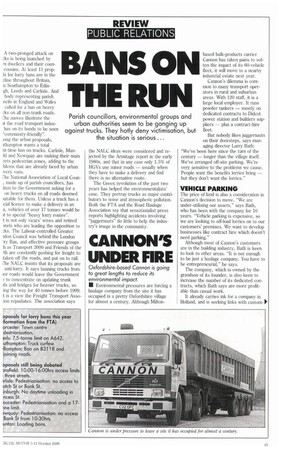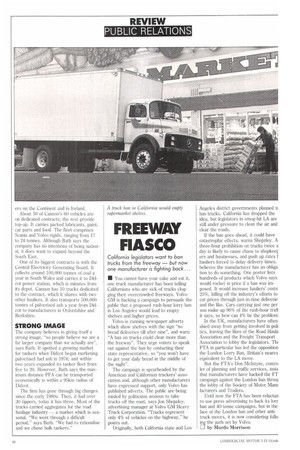CANNON'S DER FIRE
Page 47

Page 48

If you've noticed an error in this article please click here to report it so we can fix it.
Oxfordshire-based Cannon is going to great lengths to reduce its environmental impact.
Environmental pressures are forcing a haulage company from the site it has occupied in a pretty Oxfordshire village for almost a century. Although Milton based bulk-products carrier Cannon has taken pains to soften the impact of its 60-vehicle fleet, it will move to a nearby industrial estate next year.
Cannon's dilemma is common to many transport operators in rural and suburban areas. With 120 staff, it is a large local employer. It runs powder tankers — mostly on dedicated contracts to Didcot power station and builders suppliers — plus a contract-hire fleet.
But nobody likes juggernauts on their doorsteps, says managing director Larry Bath: "We've been here since the turn of the century — longer than the village itself. We've arranged off-site parking. We're very sensitive to the problems we cause. People want the benefits lorries bring — but they don't want the lorries."
VEHICLE PARKING
The price of and is also a consideration in Cannon's decision to move. "We are under-utilising our assets," says Bath, who has been with the company for 10 years. "Vehicle parking is expensive, so we are looking to off-load lorries on to our customers' premises. We want to develop businesses like contract hire which doesn't need parking."
Although most of Cannon's customers are in the building industry, Bath is keen to look to other areas. "It is not enough to be just a haulage company. You have to be entrepreneurial," he says.
The company, which is owned by the grandson of its founder, is also keen to increase the number of its dedicated contracts, which Bath says are more profitable than casual work.
It already carries ink for a company in Holland, and is seeking links with custom ers on the Continent and in Ireland.
About 50 of Cannon's 60 vehicles are on dedicated contracts: the rest provide top-up. It carries packed lubricants, paint, car parts and food. The fleet comprises Scania and Volvo rigids, ranging from 17 to 24 tonnes. Although Bath says the company has no intentions of being national, it does want to expand beyond the South East.
One of its biggest contracts is with the Central Electricity Generating Board. It collects around 100,000 tonnes of coal a year in South Wales and carries it to Didcot power station, which is minutes from its depot. Cannon has 10 trucks dedicated to the contract, which it shares with two other hauliers. It also transports 500,000 tonnes of pulverised ash a year from Didcot to manufacturers in Oxfordshire and Berkshire.
STRONG IMAGE
The company believes in giving itself a strong image, "so people believe we are a far larger company than we actually are", says Bath. It spotted a growing market for tankers when Didcot began marketing pulverised fuel ash in 1978, and within two years expanded its tanker fleet from live to 20. However, Bath says the maximum distance PFA can be transported economically is within a 95km radius of I )idcot.
The firm has gone through big changes since the early 1980s. Then, it had over :30 tippers, today it has three. Most of the trucks carried aggregates for the road haulage industry — a market which is seasonal. "We went through a difficult period," says Bath. "We had to rationalise and we chose bulk tankers."










































































































































































